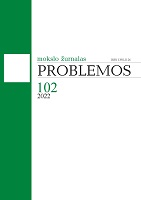Moral Self-Realization in Kant and Spinoza
Moral Self-Realization in Kant and Spinoza
Author(s): Wojciech KozyraSubject(s): Metaphysics, Epistemology, Ethics / Practical Philosophy, Early Modern Philosophy, German Idealism
Published by: Vilniaus Universiteto Leidykla
Keywords: Spinoza; Kant; self-realization; self-sacrifice; interest; enlightenment;
Summary/Abstract: Spinoza and Kant are considered to be polar opposites with respect to ethics. The radical difference between them is supposed to consist in Spinoza’s ethical egoism, or interest-based Strebensethik, and Kant’s duty-cantered, deontological Sollensethik. I challenge this opposition and argue that both in Kant and Spinoza we deal with a notion of the self’s realization that is “interest”-based and therefore does not involve self-sacrifice. I show, on the one hand, that the streben in Spinoza’s Strebensethik consists in realising one’s essentially human interest, which resides in ethical-rational action, and, on the other hand, that sollen in Kant’s Sollensethik is in fact a streben of the Kantian “proper self” (eigentliches Selbst) after the realization of its ethical-rational interest.
Journal: Problemos
- Issue Year: 2022
- Issue No: 102
- Page Range: 22-35
- Page Count: 14
- Language: English

